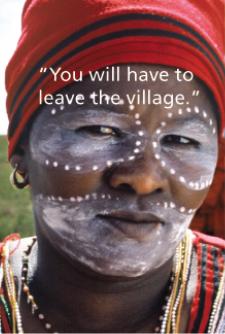You are here: Home » KIT Information & Library Services » ILS Information products » HEALTH-RELATED STIGMA
KIT Dossier Health-related stigma
Text by Wim van Brakel
Health - Leprosy Unit, Royal Tropical Institute
The Health Department of the Royal Tropical Institute coordinates the activities of the ICRAAS, the International Consortium for Research and Action Against health-related Stigma
The Consortium was established in November 2004, as an initiative of the participants of the international Research Workshop on Health-Related Stigma and Discrimination, held in The Netherlands.
The aim of the ICRAAS is to reduce health-related stigma and its harmful consequences, including discrimination and social exclusion. ICRAAS builds on the existing body of research and implementation experiences of its consortium partners. It aims to deepen understanding of stigma processes and develop measurement tools and stigma reduction strategies through sharing, combining and exchanging knowledge and expertise and through collaborative future research and actions on health-related stigma and discrimination.
ICRAAS Objectives
- Facilitate the exchange of knowledge and expertise on health-related stigma and its consequences between researchers working in different public health fields.
- Stimulate action against health-related stigma and action to promote social inclusion.
- Exchange instruments and toolkits between public health fields.
- Support scientists from the South in studying health-related stigma and its consequences and stigma reduction activities.
- Provide a platform for scientific discussion of issues related to health-related stigma and discrimination.
- Create a multi-discipline forum of scientific excellence in the field of health-related stigma research to guide and monitor research projects carried out under its umbrella.
- Increase the scientific credibility of funding applications to major donor agencies made under the umbrella of the consortium.
SARI Project (Stigma Assessment and Reduction of Impact) July 2007
Research proposal
Many people are severely affected by leprosy-related stigma and social exclusion. This stigma can prove very persistent and disabling and may be experienced as worse than the condition itself. The people effected by leprosy and often also their family members are denied full social acceptance. In many cases, stigma has also a direct impact on their economic situation. Apart from these direct effects on individuals and groups of people, stigma and discrimination often form a major barrier for the effective implementation of leprosy programmes.
Awareness of the importance of health-related stigma is increasing and many projects have gained some experience with stigma reduction activities. However, much of this experience remains local, and the effectiveness and impact of these interventions is not know or measured. The SARI project will examine experiences with stigma reduction strategies such as empowerment, contact, socio economic rehabilitation or other interventions not yet specifically described, used in Community Based Rehabilitation (CBR) programmes.
The impact of these stigma reduction strategies and activities will be evaluated by comparing stigma levels in communities where CBR programmes are operating, with comparable communities that have not benefited from these interventions.
- To document in detail the stigma reduction interventions used.
- To study the effectiveness of strategies and activities in terms of impact on social participation and inclusion.
- To validate a toolkit of existing stigma assessment instruments that can be used for baseline assessments and monitoring and evaluation of stigma reduction interventions in the field of leprosy.
Specific objectives
The study will be carried out with partners in India as a pilot project. The study will involve people affected by leprosy in all aspects of the project. The study will take 24 months and will include four CBR programmes and four control areas without CBR activities. During an expert meeting in September 2007 a selection will be made of instruments to measure the different aspects of stigma (enacted stigma (discrimination), perceived stigma and self or internalized stigma) and its impact on social participation. Both quantitative and qualitative methods will be considered.

Related item
Snelkoppelingen
Agenda News Press Working at KIT About KIT Cookies Contact
Nederlands -English




